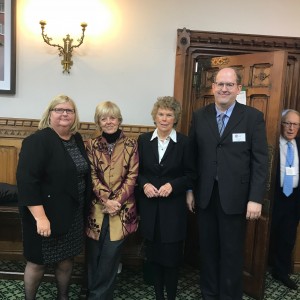The Professional Paralegal Register (PPR), a voluntary register for paralegals in England and Wales, will see paralegals come under voluntary regulation for the first time. The register will provide protection for consumers and reassure consumers that legal work carried out by paralegals will be of the highest quality, at a reasonable cost.
J.M. Glendinning Professional Risks Limited - Professional Indemnity Insurance
After discussions with the team at J.M. Glendinning Professional Risks Limited, we are pleased to tell our members that they meet the PPR’s exacting standards of Professional Indemnity Insurance providers.
If you would like to learn more, please see below their contact details:
Kate Cooper BA(Hons) ACII
Chartered Insurance Broker
J.M. Glendinning (Insurance Brokers) Professional Risks Limited
Elmwood House, Ghyll Royd, Guiseley, Leeds, LS20 9LT
Direct Dial: 01943 660816
Mobile: 07766 391670
National Association of Licensed Paralegals (NALP) have ceased being a Recognised Body of the PPR
PLEASE VIEW OUR GUIDANCE DOCUMENT FOR ALL THOSE EFFECTED.
DOWNLOAD HERE
Important Notice
The PPR would like to advise that the National Association of Licensed Paralegals (NALP) have ceased being a Recognised Body of the PPR from today – 4 th July 2017.
Paralegals
We would like to reassure all NALP/PPR members that the Directors, Regulatory Committee and the Advisory Board are aware of the difficulties that these members are now facing and we are working hard to publish guidance on the options that these members have open to them due to this situation.
Our focus and commitment at this time is to ensure that existing NALP/PPR members and consumers are continually protected by the PPR.
Please be patient with us – we are working with our key stakeholders to be able to publish the options within the next 24 hours, and if possible by the end of today.
If you have specific queries after the guidance is published then please call the PPR on 0203 034 1486 or email us at [email protected]
Consumers
The PPR would like to reassure consumers who are currently utilising the services of a PPR member who is also a NALP member, that where work commenced on or before 3 rd July 2017, this work will continue to be fully protected to the same extent that it was prior to NALP ceasing to be a Recognised Body.
For work commenced after 3 rd July 2017, PPR protection will still be available to all existing PPR/NALP members through options that we are making available to them within 24 hours of this communication. If you are unsure of the level of protection that your NALP/PPR Paralegal can offer you, then please call the PPR on 0203 034 1486 or email us with your query [email protected]
New Vacancies for PPR Committee
The PPR Regulatory Committee seeks two new members for its regulatory committee. A committee member and a Chair.
These are voluntary positions and require experience of compliance, regulatory, arbitration, consumer protection or complaints handling.
For Further information please e mail [email protected]
Offering Legal Services - Are we clear now?
Having attended the Westminster Policy Forum Keynote Seminar on The Legal Services Market- Regulation, Innovation and the Future of the Legal Services Act, I think I can honestly say that at last some progress on debates that have rumbled on for years, has been made.
Regulation and the Legal Services Act
We have the Competition and Markets Authority to thank back in 2001, from their former remit under The Office of Fair Trading, for producing a report which led to the Clementi Review and finally The Legal Services Act 2007.
Why do we thank them? Well, in the main there have been many positives that have come out of the LSA 2007, not least the discussions and reports over the last nine years that have led us to a more diverse legal profession with more focus on the consumer both in terms of choice and protection.
The Legal Services Act was fit for purpose in 2007, but the provision of legal services has moved on to become ever more consumer driven, that requires innovation at the heart of its thinking. A new Act of Parliament is therefore needed to cope with the latest trends in legal service provision.
The illogical reserved activities under the LSA 2007 have been a barrier to a progressive legal services market, preventing professional, competent and often more cost effective unregulated providers to compete in the market place. Of course I am talking about PPR Paralegals who now have the ability to be subject to voluntary regulation under the PPR and have Paralegal Practising Certificates. Why should our professionals be prevented from conducting litigation when they are competent to do so? Does this help to combat the crisis that we have in the civil courts where litigants in person are an ever increasing occurrence with no legal representation in sight?
The Legal Services Board has published its ‘Vision on Reform’ and a key component of that is to replace the current eight regulatory objectives with just one:
‘Safeguard the public interest by protecting consumers and ensuring the delivery of outcomes in the interests of society as a whole.’
At a first glance it is difficult to argue against its sentiment but a closer look raises the question as to who decides what is in the public’s interest? Isn’t cost effective legal services paramount to addressing the unmet legal need, even if it is unregulated?
The regulatory landscape is cumbersome, the LSA 2007 itself is 400 pages long. Regulation is now being championed by the SRA on a risk-based approach and recent indications suggest that in order to cut the cost of regulation, the corporate sector may well be left to a certain degree, to regulate itself.
The LSB appears to be seeking complete regulatory independence of regulators from any representative or commercial interests. This is to be applauded and if it is ever achieved then it is quite possible that the role of the LSB will no longer be required.
The SRA has circa 1,000 new ABS’s likely to be licensed this year. This is good news to help open up the market and to welcome innovation into the sector.
So what can the LSB and its regulators do to ensure that the legal services market truly offers the consumer what it needs?
Firstly, it needs to embrace the opening up of the market to include ‘unregulated’ providers such as Professional Paralegals. Secondly, in order to enable growth in the sector, the burden of regulation needs to be lifted where it is not needed, and finally they should address the need for education of consumers, to enable them to make informed choices.
Kathryn Stone, Chief Legal Ombudsman recently made an extremely valid point that redress for consumers needs to develop alongside the regulatory framework.
Consumers need to know prior to engaging a provider of legal services, what right for redress they have and to whom, should things go wrong.
This is where the PPR has bridged the gap- consumer clients of our members have redress through the PPR where otherwise they have no redress not even from the Legal Ombudsman.
Legal Services
More recently, the CMA published its interim findings on the supply of legal services and I agree with their conclusion that the lack of transparency on price and service is undermining competition, reducing the incentives for providers to compete on price, quality and innovation.
So, what are we getting wrong?
The rise of comparison websites has made it easier for consumers to compare legal service providers in terms of recommendation, but it would appear that legal service providers are still not being clear and transparent with consumers in terms of costs and the services that they will receive.
Latest findings show that 46% of legal services to the consumer are concluded on a fixed fee basis. This clearly indicates a preference by consumers to know how much the service will cost them up front. Of course not all services are easy to bundle or unbundle to provide a fixed fee cost but areas that are procedure driven such as conveyancing are finding fixed fees a popular choice by their clients.
Two thirds of consumers recently surveyed think that legal services are too expensive. Small businesses, that make up 99% of British businesses think that legal services are unaffordable and turn to their accountants, HR departments or google for advice, even though 86% of them agree that legal services are essential to their business.
Of course there is the school of thought that suggests that stimulating competition by price alone effects professional standards. But why should that be?
The costs for legal services is not and never has been an indication of professionalism.
Solicitors cannot offer unregulated legal services outside of a regulated entity, but if they could, does that mean it would affect their professional standards?
It would appear that legal service providers need to provide clearer signals in terms of services offered, the quality of those services, and the costs that they charge at the point of need.
With 1:4 consumers now actively shopping around for legal services, 1:4 using on-line services and 1:5 using unbundled services, legal service providers need to address the needs of individual consumers, corporate consumers and SME consumers and not offer a one-size fits all package.
PPR Voluntary Regulation
We already put the consumer at the heart of our regulatory scheme. We have a complaints procedure and a compensation fund available for clients of PPR Professional Paralegals who have a Paralegal Practising Certificate.
We will over the coming year be looking at transparency in terms of services offered and costs. It is not for us to tell you the type of business model you should have or the type of fee structure, but it is our role to inform you of current trends in the way that consumers want to access and pay for their legal services.
Fixed fees appear to be the preferred option for consumers however where this is not possible, then it is clear that consumers need to know the full extent of the actual and likely costs at the point of need.
The future for PPR Paralegals is bright, the opportunities for you to grow your businesses have never been so good. If you are not a member of the PPR and do not have a Paralegal Practising Certificate then in terms of redress for consumers, you will quite simply be unable to compete.
Rita Leat, Managing Director, PPR
PPR Announcement: PPR Position On NALP
24th July 2017
We have had queries regarding video publications made by NALP inferring that the PPR values have changed, and it has become incumbent on me to answer those queries.
The PPR was set up by NALP and IoP as a direct response to recommendations made by the LETR that a regulator should come forward for the unregulated sector.
Both organisations committed to developing such a voluntary regulatory scheme for the benefit of the sector and for greater consumer protection. These values set up by NALP and IoP remain unchanged.
The NALP were present and active at the PPR Conference on 22nd June and our values have not changed since that date, when one can assume that NALP agreed with our values. We are unable to comment further on what NALP believe is a change in our values as they have declined to provide any clarification.
The success of the PPR is dependant on the vetting of membership bodies to ensure that they meet the required standard in ensuring their application processes reflect good practice and that they have a sound, fair and reasonable complaints procedure to handle Tier 1 and 2 complaints prior to being finally reviewed and adjudicated by an independent regulator where required. These values remain unchanged.
For accountability and credibility, it is vital that the sector has an independent regulatory scheme. The IoP previously issued ‘Practising Certificates’ which was wholly inappropriate, as a membership body should not act as a regulator during the final outcome of a complaints process. The IoP withdrew their practising certificates and embraced the new regulatory regime and now has a high number of IoP members registered or regulated by the PPR. The IoP remain committed to the PPR as removal would be a great detriment to their members and to the sector as a whole.
The NALP maintained its ‘Licensed’ Paralegals, very small in number, assuring the PPR that this was a ‘Membership Level’ only, as there was no substance behind it and not an actual licence to practise. Unfortunately, the NALP decided to maintain its ‘Licensed’ Paralegal status which the PPR felt was confusing for the consumer, and therefore in this context, the NALP did not embrace the new regulatory regime to the same extent as the IoP.
The PPR values have not changed and we firmly believe as do our supporters from the Legal Ombudsman’s office that independent regulation is vital.
The PPR is shocked and saddened by the actions of NALP in deciding to promote a Licensing Scheme with no discussion with the PPR or any other of the key legal stakeholders. We do not believe that this is in the best interests of the sector or consumers.
We would expect any of our Recognised Bodies to consult their members before withdrawal from the PPR so that we can ensure that they can be accommodated without unnecessary detriment being caused. We will be seeking to include this in our rules going forwards.
The PPR is a voluntary Regulator and not a membership body and it spent almost two years consulting with key stakeholders before it was robust enough to offer the credibility and accountability that a regulator should do.
There are many membership bodies offering self-regulation with no substance behind them and no real redress for consumers. This is what NALP and the IoP have fought against. It would appear that perhaps NALP’s values have changed and not the PPR’s.
We do not recognise any membership body’s self-regulation certificates or licences as this would be a bleak step backwards for the sector and for consumer protection.
The PPR remains focused on what is right and will continue to support the sector to promote its members as the Fourth Arm of the Legal Profession.
Regulation for Paralegals is voluntary and we would advise all Paralegals who choose to be regulated to choose wisely.
PPR Conference 2017- Tickets are now on sale
The PPR are delighted to bring you its second conference for Paralegals on 22nd June at Wyboston Lakes, Bedford. Managing Director Rita Leat commented,
“ Last year’s conference was a sell-out and a huge success due to the delegates’ enthusiastic engagement throughout the whole day. We have an even better line-up of workshops this year along with high profile speakers from the profession. It will provide a fantastic opportunity for networking and for keeping up to date with sector developments”.
PPR Conference 2018 Highlights
The PPR Conference 2018 was a great success
Thank you to everyone who attended and made it the best one yet, we hope to see you next time!
Here are some of the highlights, who can spot themselves?
PPR Forum Meeting at the House of Commons
The PPR Forum Meeting at the HoC on 28th November was attended by 30 key stakeholders in the sector. Kate Hoey MP hosted the event to show her support for the work of the PPR. The PPR is now recognised as the voluntary over-arching regulator for all those who offer legal services or give legal advice in the unregulated sector.
Sean-Randall Morris, Chairman of the Regulatory Committee has given the green light for the PPR to be able to regulate individuals across the globe, as the over-arching voluntary regulatory regime is suitable for all those who practice English Law.
Paralegals are to be encouraged to join the PPR as are membership bodies who operate self-regulatory schemes that in the main offer no real protection for the consumer.
Derek Wood, CBE, QC has launched a supporters group for the PPR with many stakeholders signing up including the Legal Ombudsman; Which? Legal; The Citizenship Foundation and many more. The supporters group assists with the commitment of the PPR and its recognised bodies to enhance PLE.
PPR Paralegal Practising Certificates issued by the PPR are the only practising certificates that ate authorised by the over-arching regulator.
Pictured below from L to R:
Rita Leat, Managing Director, PPR; Baroness Diane Hayter of Kentish Town; Kate Hoey MP, Ian Grant, Director PPR






